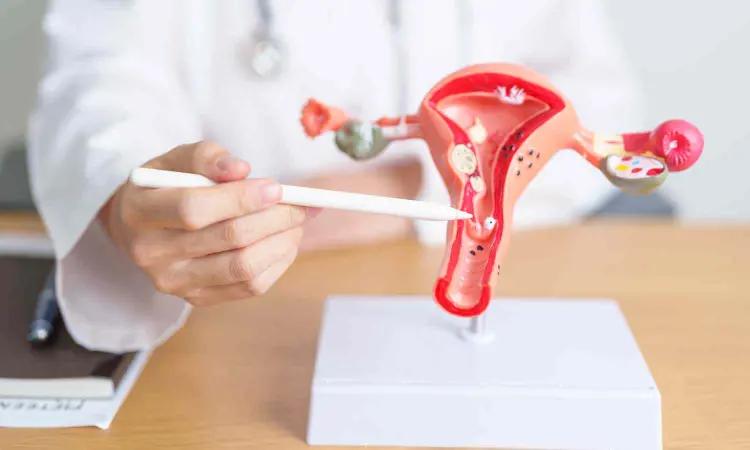- Home
- Medical news & Guidelines
- Anesthesiology
- Cardiology and CTVS
- Critical Care
- Dentistry
- Dermatology
- Diabetes and Endocrinology
- ENT
- Gastroenterology
- Medicine
- Nephrology
- Neurology
- Obstretics-Gynaecology
- Oncology
- Ophthalmology
- Orthopaedics
- Pediatrics-Neonatology
- Psychiatry
- Pulmonology
- Radiology
- Surgery
- Urology
- Laboratory Medicine
- Diet
- Nursing
- Paramedical
- Physiotherapy
- Health news
- Fact Check
- Bone Health Fact Check
- Brain Health Fact Check
- Cancer Related Fact Check
- Child Care Fact Check
- Dental and oral health fact check
- Diabetes and metabolic health fact check
- Diet and Nutrition Fact Check
- Eye and ENT Care Fact Check
- Fitness fact check
- Gut health fact check
- Heart health fact check
- Kidney health fact check
- Medical education fact check
- Men's health fact check
- Respiratory fact check
- Skin and hair care fact check
- Vaccine and Immunization fact check
- Women's health fact check
- AYUSH
- State News
- Andaman and Nicobar Islands
- Andhra Pradesh
- Arunachal Pradesh
- Assam
- Bihar
- Chandigarh
- Chattisgarh
- Dadra and Nagar Haveli
- Daman and Diu
- Delhi
- Goa
- Gujarat
- Haryana
- Himachal Pradesh
- Jammu & Kashmir
- Jharkhand
- Karnataka
- Kerala
- Ladakh
- Lakshadweep
- Madhya Pradesh
- Maharashtra
- Manipur
- Meghalaya
- Mizoram
- Nagaland
- Odisha
- Puducherry
- Punjab
- Rajasthan
- Sikkim
- Tamil Nadu
- Telangana
- Tripura
- Uttar Pradesh
- Uttrakhand
- West Bengal
- Medical Education
- Industry
Sex Hormones Increase Endometrial Cancer Risk in Postmenopausal Women: Study

Researchers have identified in a new study that high levels of circulating sex hormones have a greater risk of endometrial cancer (EC) in postmenopausal women but a lower risk with high levels of sex hormone-binding globulin (SHBG). The study was conducted by Pengfei Z. and fellow researchers published in the European Journal of Obstetrics & Gynecology and Reproductive Biology.
Endometrial cancer, a prevalent gynecologic malignancy, is recognized as hormonally sensitive. Although endogenous sex hormones like estrogens and androgens have long been suspected to play a role in EC risk, results from different studies have been inconsistent. This new meta-analysis sought to combine the evidence regarding the association between several circulating sex hormones such as estrogens, androgens, and SHBG and EC risk, with specific emphasis on postmenopausal women where the hormonal alterations are more significant and the risk for EC is elevated.
The authors performed systematic searches in the PubMed, Web of Science, and Scopus databases to find relevant observational studies. Sixteen included studies were identified as eligible in the final analysis, and they had data that were pooled through a random effects model. The strength of association between hormone level and risk for EC was analyzed using odds ratios (ORs) and 95% confidence intervals (CIs). There was also an analysis of the non-linear dose–response association and the test of the effects of possible modifiers including age, menopausal status, type of cancer, study design, geographic location, and levels of covariate adjustments.
Key Findings
Strong and statistically significant associations between increased levels of certain endogenous hormones and increased EC risk were identified by the meta-analysis:
• Total testosterone: OR 1.70 (95% CI not reported)
• Free testosterone: OR 1.75
• Dehydroepiandrosterone sulfate (DHEAS): OR 1.39
• Androstenedione: OR 1.58
Estrogens also showed strong associations with increased EC risk:
• Estrone: OR 1.55
• Unconjugated estrone: OR 1.86
• Estradiol: OR 1.38
• Unconjugated estradiol: OR 2.14
• Estriol: OR 1.75
• Unconjugated estriol: OR 1.99
• Conjugated estrogens had no marked association with EC risk, implying that the type of estrogen can be very important.
This comprehensive meta-analysis results in the determination that higher endogenous sex hormone levels both androgens and estrogens are predictive of a markedly elevated risk for endometrial cancer in postmenopausal women. Higher levels of SHBG, conversely, would decrease the risk for EC. These results point toward hormone profiling as a worthwhile adjunct to risk assessment for EC and highlight an increased need for monitoring in women postmenopausal with a heightened level of hormones.
Reference:
Zhu, P., Ren, J., Sun, J., Geng, J., Wang, H., & Ma, M. (2025). The association of endogenous sex hormones with endometrial cancer risk: A systematic review and meta-analysis. European Journal of Obstetrics, Gynecology, and Reproductive Biology, 113997, 113997. https://doi.org/10.1016/j.ejogrb.2025.113997
Dr Riya Dave has completed dentistry from Gujarat University in 2022. She is a dentist and accomplished medical and scientific writer known for her commitment to bridging the gap between clinical expertise and accessible healthcare information. She has been actively involved in writing blogs related to health and wellness.
Dr Kamal Kant Kohli-MBBS, DTCD- a chest specialist with more than 30 years of practice and a flair for writing clinical articles, Dr Kamal Kant Kohli joined Medical Dialogues as a Chief Editor of Medical News. Besides writing articles, as an editor, he proofreads and verifies all the medical content published on Medical Dialogues including those coming from journals, studies,medical conferences,guidelines etc. Email: drkohli@medicaldialogues.in. Contact no. 011-43720751


